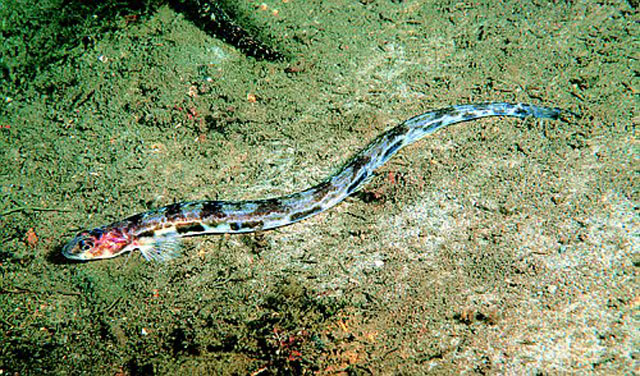| Stichaeidae (Pricklebacks), subfamily: Lumpeninae |
| 50 cm TL (male/unsexed) |
|
demersal; depth range 30 - 373 m, non-migratory |
| North Atlantic: Spitsbergen southward to Scandinavian coasts, North Sea, southern part of the Baltic, the Faroes, Iceland and south-eastern coasts of Greenland. Elsewhere, western coasts of Greenland; also, Labrador and Newfoundland to Massachusetts Bay (subspecies Lumpenus lumpretaeformis serpentinus Storer, Ref. 51666). |
|
Elongated, eel-like fish with a pointed caudal fin. A single dorsal fin extends almost throughout the entire length of the body. The anal fin covers about two-thirds of the total length. Pale brown dorsally, becoming bluish on the sides, and greenish-yellow ventrally. There are numerous irregular brown patches on the body (Ref. 35388). |
| A benthic species (Ref. 58426), living in Y-shaped tubes in the mud in 50-200 m depth (Ref. 35388). The burrows are believed to be used for parental care of the eggs (Ref. 80819) . Feeds on small crustaceans, mollusks, brittle stars and worms (Ref. 5204). Matures at 3 years with about 20 cm length. Spawning takes place in December - January, 1,000 eggs are laid on the sea floor, in deep water (Ref. 35388). Isolated population in the Baltic Sea is probably a relict from the last ice age (Ref. 35388) that reached the Baltic Sea during the early saltwater stage of the sea (Ref. 82152; 82153). |
|
Not Evaluated
(Ref. 96402)
|
| harmless |
|
Source and more info: www.fishbase.org. For personal, classroom, and other internal use only. Not for publication.
Page created by Jen, 05.08.02,
php script by kbanasihan 06/09/2010 ,
last modified by
dsantos, 20/08/10

